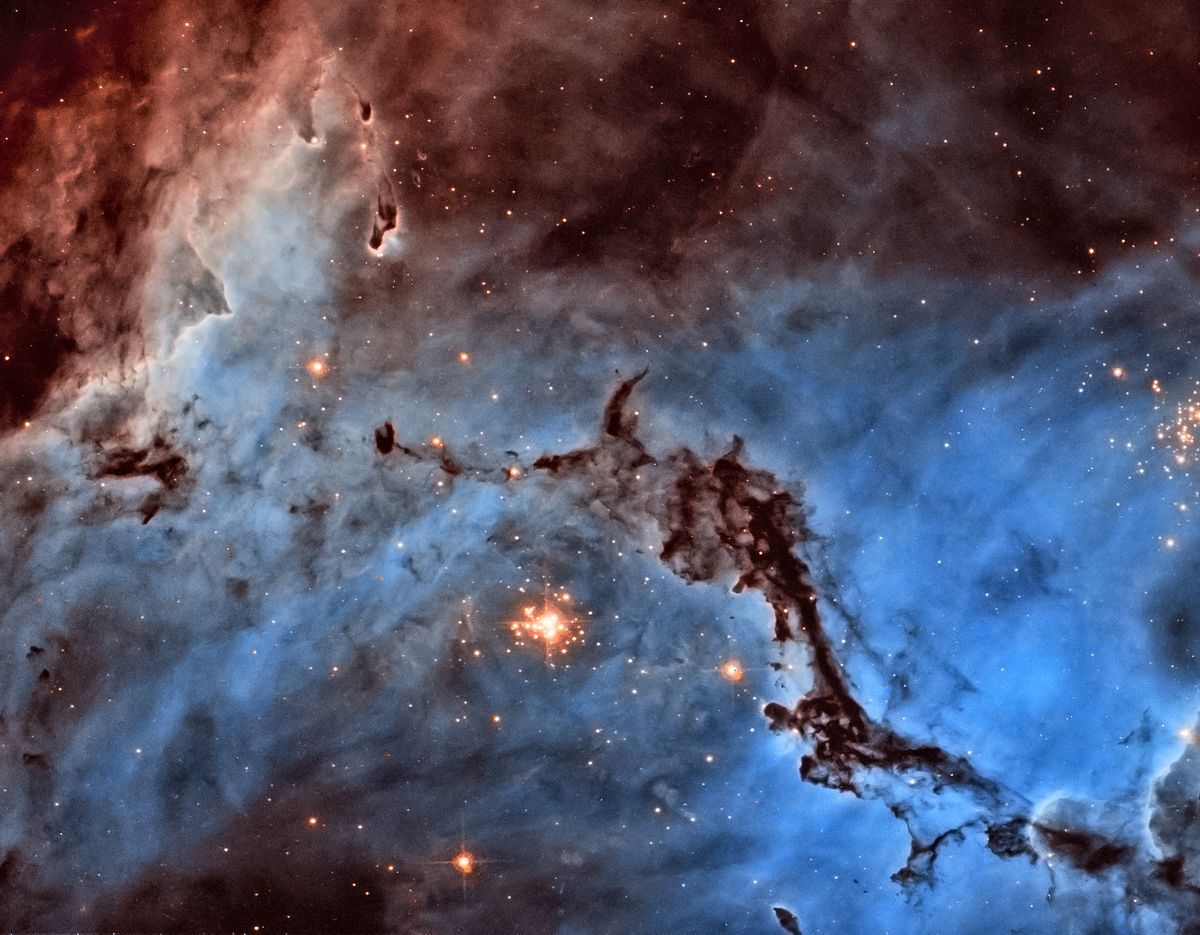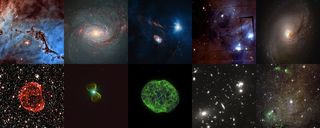Stunning Hubble Telescope 'Hidden Treasures' Revealed in Photo Contest

Swirling galaxies, glowing nebulas and shimmering stars: these are the winners in a public contest to unearth beautiful images from the horde of unprocessed data collected by the Hubble Space Telescope.
The gorgeous pictures many of us associate with the Hubble Space Telescope don't come fully formed as we see them. In fact, the famous photos are the product of significant work on the part of scientists who sort through, process and transform the raw data into photogenic form. But Hubble collects so much data that researchers can only process a certain amount of it into aesthetic beauty. The rest is used for scientific study, but remains visually lackluster.
In an effort to harvest some of these unsung gems, NASA and the European Space Agency, which run the telescope, invited the public to pore through the archive of more than a million pictures taken by Hubble and transform the images themselves.
"The vast amount of data in the archive means that there are still many hundreds of beautiful images scattered among the valuable, but visually unattractive, scientific data that have never been enjoyed by the public," Hubble officials wrote in a statement. "We call these pictures Hubble's hidden treasures, and a few months ago, we invited the public to look through Hubble's science archive to help us find them." [Gallery: See all 21 Hubble Hidden Treasures Photo Winners]
More than 3,000 entries poured in under two categories: processed images, as well as unprocessed photos that were nonetheless beautiful but had been left hidden in the collection.
The top winner for image processing wasJosh Lake, who created a gorgeous image of the star-forming region NGC 1763 in the nearby Large Magellanic Cloud dwarf galaxy.
Hubble had observed this area in different bands, separating out the light from glowing hydrogen and nitrogen. Although these two gases would both appear reddish to the human eye, Lake colored one blue and the other red to highlight the contrast between the two elements and reveal the underlying structure of the region. Lake's image, which won both the jury's vote and the public vote, was awarded an Apple iPad as well as various other prizes, including a book, DVD, poster, and an autographed photo of an astronaut who'd visited Hubble.
Sign up for the Live Science daily newsletter now
Get the world’s most fascinating discoveries delivered straight to your inbox.
The winner in the image search category was Brian Campbell, who uncovered an unprocessed, yet striking, photo of the barred spiral galaxy NGC 6300. The swirling bright light of the galaxy glimmers against a background of stars with dark blotches of dust creating interesting patterns in the light. Campbell was awarded an iPod Touch, as well as a poster, wall print, book and DVD.
Here are the other winners:
Image Processing Prize:
First prize and winner of the public vote: Josh Lake, star-forming region NGC 1763
Second prize: Andre van der Hoeven, spiral galaxy Messier 77
Third prize: Judy Schmidt, star XZ Tauri
Fourth prize: Renaud Houdinet, nebula Chamaeleon I
Fifth prize: Robert Gendler, spiral galaxy Messier 96
Sixth prize: Claude Cornen, SNR 0519-69
Seventh prize: Josh Barrington, PK111-2.1
Eighth prize: Flickr user kyokugaisha1, NGC 1501
Ninth prize: Nick Rose, Abell 68
Tenth prize: Nikolaus Sulzenauer, dwarf galaxy IC 10

Basih Image Searching Prize:
First prize: Brian Campbell, NGC 6300
Second prize: Alexey Romashin, V* PV Cephei
Third prize: Luca Limatola, IRAS 14568-6304
Fourth prize: Kathlyn Smith, NGC 1579
Fifth prize: Adam Kill, B 1608+656
Sixth equal prize: Kathy van Pelt, NGC 4490
Sixth equal prize: Ralf Schoofs, NGC 4217
Eighth prize: Matej Novak, NGC 6153
Ninth prize: Gavrila Alexandru, NGC 7814
Tenth prize: Linda Morgan-O’Connor, NGC 7026
The public vote was won by Budeanu Cosmin Mirel for NGC 4100
The Hubble Space Telescope has been snapping photos of the universe since its launch in April 1990. The orbiting space observatory is a joint mission by NASA and the European Space Agency.
This story was provided by SPACE.com, a sister site to LiveScience. Follow SPACE.com on Twitter @Spacedotcom. We're also on Facebook & Google+.












